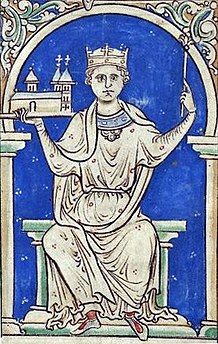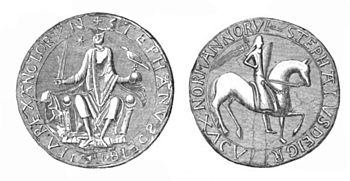Stephen of Blois: King of England
 \ \ | |||
| Miniature from Matthew Paris's Historia Anglorum |
Background:
Stephen was the third son of Stephen, Count of Blois and Chartres, and Adela, daughter of King William I the Conqueror. He was reared by his uncle, King Henry I, and received vast lands in England, Normandy, and the county of Boulogne. With a number of other magnates he was pledged to support Henry’s daughter, Matilda (q.v.), as successor to the throne. Nevertheless, many English nobles were reluctant to accept a woman ruler, and Henry’s Norman subjects resented Matilda’s marriage into an Angevin family. Consequently, after Henry I died in December 1135, the leading lords and bishops welcomed Stephen when he crossed the English Channel to claim the crown. In return for support from the pope, Stephen opened the way to increased papal influence in English political affairs.
In 1120, the English political landscape changed dramatically. Three hundred passengers embarked on the White Ship to travel from Barfleur in Normandy to England, including the heir to the throne, William Adelin, and many other senior nobles. Stephen had intended to sail on the same ship but changed his mind at the last moment and got off to await another vessel, either out of concern for overcrowding on board the ship, or because he was suffering from diarrhoea.The ship foundered en route, and all but two of the passengers died, including William Adelin, who went back to save his half-sister Matilda in a selfless act that cost him is life.
With William Adelin dead, the inheritance to the English throne was thrown into doubt. Rules of succession in western Europe at the time were uncertain; in some parts of France, male primogeniture, in which the eldest son would inherit a title, was becoming increasingly popular. It was also traditional for the King of France to crown his successor whilst he himself was still alive, making the intended line of succession relatively clear, but this was not the case in England. In other parts of Europe, including Normandy and England, the tradition was for lands to be divided up, with the eldest son taking patrimonial lands—usually considered to be the most valuable—and younger sons being given smaller, or more recently acquired, partitions or estates. There was no precedent of a woman ruler. The problem was further complicated by the sequence of unstable Anglo-Norman successions over the previous sixty years — William the Conqueror had gained England by force; two of his sons, Robert Curthose and William Rufus, had fought a war amongst themselves for the throne, with Rufus, who was younger, emerging victorious; and Henry had likewise acquired control of Normandy only by force. There had been no peaceful, uncontested successions.
Stephen married Matilda of Boulogne (c. 1103-1152 CE) sometime in or prior to 1125 CE. Matilda was the daughter of Eustace III, Count of Boulogne and Mary of Scotland, daughter of Malcolm III of Scotland (r. 1058-1093 CE) and the sister of Henry I's wife. She would be a formidable ally in her husband's fight to keep his crown, both in terms of finances and leadership. Stephen was said to be good-looking, pious, chivalrous, and charming to everyone, even poor people. He would need all of these qualities to rally sufficient support around him in the coming decades.
Despite Henry's wishes, many barons did not like the idea of a female ruler or the idea of a member of the house of Anjou as their sovereign and so they supported their own man Stephen, Count of Blois, then the richest baron in England. Stephen also had a very decent pedigree as a grandson of William the Conqueror and a nephew of Henry I. Crucially, at the time of the king's death in December 1135 CE, Stephen was the first to arrive in England while Matilda remained in France. Stephen also had the advantage of being a good military leader (if not being particularly talented at anything else) and control of the royal treasury at Winchester thanks to his brother Henry being bishop there since 1129 CE. Consequently, Stephen wasted no time at all and gathered enough baronial support to be elected king on 22 December 1135 CE. He was crowned four days later in Westminster Abbey. All was not well in his kingdom, however. Matilda's claim to the throne was supported by another group of barons and so an intermittent civil war broke out.
Although Stephen was brave and energetic, his affable, mild-mannered nature prevented him from providing firm leadership. The lawlessness of his Flemish mercenaries and the desperate measures he took to build a party loyal to himself only alienated the barons. Hence, in 1138 Matilda’s half brother, the powerful Robert, Earl of Gloucester, took up arms in support of Matilda’s claim. At first Stephen scored several military triumphs, but he lost the support of the church when he arrested Bishop Roger of Salisbury and his relatives.
Stephen's new Anglo-Norman kingdom had been shaped by the Norman conquest of England in 1066, followed by the Norman expansion into south Wales over the coming years.[60] Both the kingdom and duchy were dominated by a small number of major barons who owned lands on both sides of the English Channel, with the lesser barons beneath them usually having more localised holdings. The extent to which lands and positions should be passed down through hereditary right or by the gift of the King was still uncertain, and tensions concerning this issue had grown during the reign of Henry I. Certainly lands in Normandy, passed by hereditary right, were usually considered more important to major barons than those in England, where their possession was less certain. Henry had increased the authority and capabilities of the central royal administration, often bringing in "new men" to fulfil key positions rather than using the established nobility. In the process he had been able to maximise revenues and contain expenditures, resulting in a healthy surplus and a famously large treasury, but also increasing political tensions.
Stephen had to intervene in the north of England immediately after his coronation. David I of Scotland invaded the north on the news of Henry's death, taking Carlisle, Newcastle and other key strongholds. Northern England was a disputed territory at this time, with the Scottish kings laying a traditional claim to Cumberland, and David also claiming Northumbria by virtue of his marriage to the daughter of Waltheof, Earl of Northumbria. Stephen rapidly marched north with an army and met David at Durham.[66] An agreement was made under which David would return most of the territory he had taken, with the exception of Carlisle. In return, Stephen confirmed the English possessions of David's son Henry, including the Earldom of Huntingdon.
Seizing her opportunity, Matilda invaded England (September 1139). In an incredible display of chivalry, Stephen had Matilda escorted to Bristol, and she proceeded to bring most of western England under her control. Early in 1141 the Angevins captured Stephen in a battle at Lincoln. Stephen was attacked on several fronts during 1138. First, Robert, Earl of Gloucester, rebelled against the King, starting the descent into civil war in England. An illegitimate son of Henry I and the half-brother of the Empress Matilda, Robert was one of the most powerful Anglo-Norman barons, controlling estates in Normandy. He was known for his qualities as a statesman, his military experience, and leadership ability. Robert had tried to convince Theobald to take the throne in 1135; he did not attend Stephen's first court in 1136 and it took several summonses to convince him to attend court at Oxford later that year. In 1138, Robert renounced his fealty to Stephen and declared his support for Matilda, triggering a major regional rebellion in Kent and across the south-west of England, although Robert himself remained in Normandy. In France, Geoffrey of Anjou took advantage of the situation by re-invading Normandy. David I of Scotland also invaded the north of England once again, announcing that he was supporting the claim of his niece the Empress Matilda to the throne, pushing south into Yorkshire.
His cause might have been lost had not Matilda’s arrogance provoked a rebellion of the citizens of London, where she had gone for her coronation. In November Stephen was exchanged for Gloucester, who had been captured by forces loyal to the king. Stephen gradually gained the upper hand, and in 1148 Matilda withdrew from England. Although Stephen at this point exercised nominal control over most of the kingdom, he had neither the resources nor the will to suppress lawlessness and to mediate between warring nobles. He hoped only to secure the succession for his son, Eustace, but to do so he had to deal with Matilda’s son, Henry of Anjou, who invaded England in January 1153 to claim his royal inheritance. When Eustace died in August, Stephen lost heart; he signed a treaty designating Henry as his successor. At Stephen’s death, Henry ascended the throne as King Henry II.
Marriage & Children:
Stephen of Blois married Matilda of Boulogne in 1125. They had five children:
- Baldwin (died in or before 1135)
- Matilda (died before 1141), married in infancy to Waleran de Beaumont, Count of Meulan
- Eustace IV, Count of Boulogne (c. 1130 – 1153), ruled Boulogne 1146–1153
- William I, Count of Boulogne (c. 1135 – 1159), ruled Boulogne 1153–1159
- Marie I, Countess of Boulogne (c. 1136 – 1182), ruled Boulogne 1159–1182
- Gervase, Abbot of Westminster
- Ralph
- Amalric
 |
| King Stephen of England's Great Seal |
Source: Brittanica & Wikipedia
Comments
Post a Comment